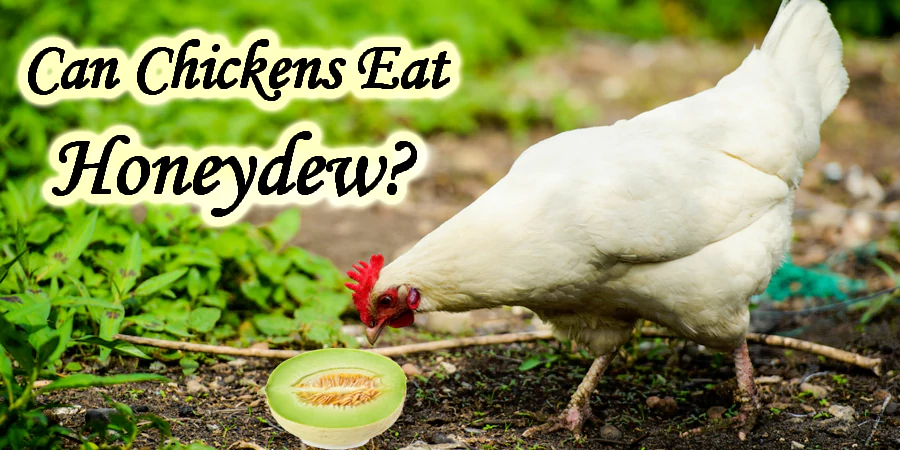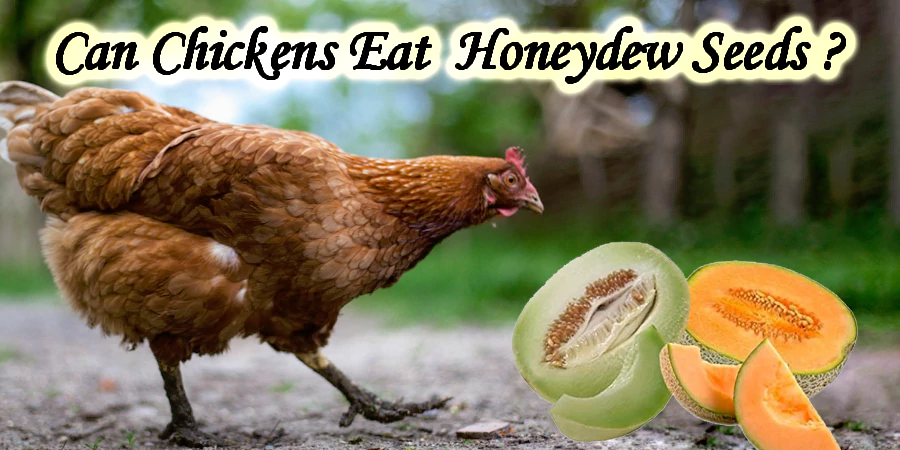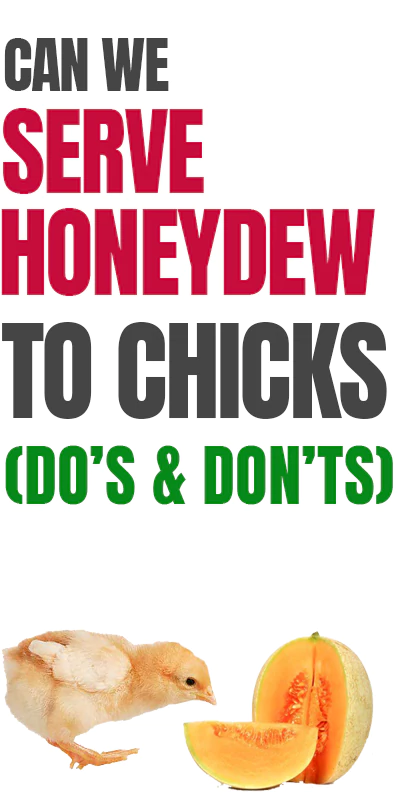Can Chickens Eat Honeydew? An Ultimate Guide
Updated: 4 Jan 24
154
Introduction:
Welcome to all the chicken enthusiasts who are searching for the insightful answer can Chickens have Honeydew in their feast? By making a detailed and meticulous correlation between Honeydew and Chicken, we are going to reveal the secrets of the dietary needs of the feathered feast. The answer will be based on a comprehensive logical ground and a conclusion will be made after covering the related queries in detail.
The well rounded nutritious diet is essential for the growth and health of our feathered friend. The potential benefits and harmful aspects of feeding Honeydew to Chickens are worth considering before making any conclusion. We have determined the best possible ways to make the Chickens happy and healthy by incorporating Honeydew melon into their diet. So, get ready for an inspiring factual analysis discovery about the dietary needs of Chickens and serving of Honeydew.

Can Chickens Eat Honeydew Melon: A Comprehensive Guide
Nutritional Value of Honeydew
Honeydew is a vitamins and minerals-rich powerhouse for feathered companions. It provides a well-balanced diet full of vitamins A and C. Honeydew is full of potassium and magnesium. The fiber content of this fruit is a big plus for Chickens.
- Vitamins: Honeydew is full of vitamin A which helps Chickens to improve their immune system and ensure the health issues related to eyes. Vitamin C protects the Chicks from various ailments by boosting their natural defensive resilience.
- Minerals: Honeydew is enriched with various types of minerals. Potassium and Magnesium are of most importance. These minerals help to strengthen the bones and enhance the muscle performance.
- Glucose: Honeydew is filled with sugar by nature. It works as an energy booster for Chickens. The chicks needed this energy during foraging.
- Fiber: The fiber content of Honeydew helps the feathered friends to resolve their digestive issues. Honeydew is just like a low-calorie snack.
- Water: Honeydew is a succulent fruit and retains a good volume of watery content. This water content helps the chickens to avoid dehydration during warm weather.
Nutritional Value per 100 Grams of Honeydew
| NUTRIENT | VALUE/100 GRAMS | NUTRIENT | VALUE/100 GRAMS |
|---|---|---|---|
| Calories | 36 Kcal | Water | 89.82 g |
| Protein | 0.54 g | Total Fat | 0.14 g |
| Carbohydrates | 9.09 g | Sugars | 8.12 g |
| Vitamin A | 3 µg | Vitamin C | 18 mg |
| Vitamin K | 2.9 µg | Potassium | 228 mg |
| Calcium | 6 mg | Iron | 0.17 mg |
| Magnesium | 10 mg | Phosphorus | 11 mg |
| Sodium | 18 mg | Zinc | 0.09 mg |
| Fiber | 0.8 g | Folate | 19 µg |
Preparation of Honeydew for Chickens?
The preparation of a Honeydew meal for feathered companions is an art. The following steps are vital for presenting Honeydew to Chickens. It will make their dining experience enjoyable with the addition of a healthy diet.
- It is advised to pick the ripened Honeydews that enhance the sweetness.
- After selecting the Honeydew fruit, thoroughly wash its exterior to avoid contaminated feeding. It will remove the hazardous effects of pesticides.
- Open the Honeydew with delicate slices and take the juicy flesh out of it.
- Remove the seeds (as per the liking of your feather friend)
- To help the easy pecking for chickens transform it into bite-size chunks. It will also avoid any type of choking issue.
- It is good to freeze the feed during scorching weather. The chickens will enjoy eating these cool chunks of Honeydew.
- Honeydew can be mixed with another diet to enhance the texture and flavor of the meal.
- To make this treat entertaining, scatter the feed in the coop.
- After serving the Honeydew to your chicks carefully observe their response and adjust accordingly.
Does Feeding Honeydew to Chickens Affect the Egg’s taste?
Yes, it is being noticed that feeding Honeydew has impacted the flavor of the eggs. It adds a subtle sweetness to the yolks. It is due to the natural sugar of the melon which compounds in the eggs during digestion. The impact is observed on yolks more than whites. Eating these eggs makes the breakfast tastier with a touch of honeydew flavor.
The effect of honeydew feed may vary in the flock according to their diet and metabolism. You can experience the honeydew flavor after a few days of serving to the Chickens.
How Does Honeydew Promote Digestion in Chickens?
Honeydew has all the enzymes that help chickens in digestion. It is full of fiber, water content, and crucial natural enzymes. These attributes play a vital role in promoting the proper digestion of food in chickens. Let’s discuss, how each of them plays a pivotal role in digestion.
- Fiber: Honeydew is full of fiber content. The fiber helps the chickens to maintain proper digestion through regular bowel movements. It helps the chickens to resolve constipation and absorb the nutrition.
- Water Content: The watery element of Honeydew helps the chickens in their hydration. It supports the breakdown process of food during the digestion phase.
- Natural Enzymes: The natural enzymes of honeydew promote the breakdown of the nutrients and make them digestible. In this way, Chickens can extract the maximum amount of nutrient value from their diet.
Which Parts of Honeydew are Edible for Chickens?
Can Chickens Eat Honeydew Seeds?
Yes, you can serve honeydew seeds to chickens as it is not harmful to digestion. The honeydew seeds are soft and small in size. It adds a crunchy flavor that stimulates the feathered friends. The honeydew seeds should be served in moderation as a part of a regular diet.
Honeydew seeds are not only safe for Chickens but also a rich source of fats and proteins. It gives a satisfying pecking experience to Chickens. It also promotes the foraging act which is an engaging manner of feeding the chickens. So, serving honeydew seeds offers additional nutritional value to the diet in an entertaining way.

Can Chickens Eat Honeydew Skin?
The honeydew skin is thin and soft which supports it in digestion. You can present honeydew skin to chicken in moderation. The Honeydew skin is prone to contamination and pesticides and therefore must be used after being thoroughly washed. The skin is rich in fiber content which promotes the proper digestion process.
In addition, it also offers a sweet flavor to the chickens. It is advised to gradually add honeydew skin with a regular diet and observe the response from Chickens. Excessive feeding of melon skin can cause digestive issues. So, a moderate feed of honeydew skin offers both fiber and crunchy texture to the diet.
Can Chickens Eat Honeydew Foliage?
Serving Honeydew leaves and vines to Chickens can result in both positive and negative effects on health. Let’s discuss the advantages and disadvantages of serving Honeydew foliage to chickens.
- Advantages: It diversifies the diet pattern of chickens and promotes foraging. It also presents the nutritional value of a well-rounded diet. Honeydew foliage provides an opportunity for chickens to engage in natural foraging behavior.
- Disadvantages: Honeydew foliage invites toxic concerns for chickens. The introduction of foliage may cause digestive problems. The pesticide effects can be a deadly factor for chickens. So, you must serve Honeydew foliage to chickens after cleaning it.
Can Chickens Eat Honeydew Rind?
Yes, you can serve Honeydew rind to chickens but must consider its pros and cons. I have enlisted some of the most effective outcomes of feeding honeydew rind to chickens.
- Positive Outcome: The honeydew rind contains a good amount of fiber content that supports the digestion process. It motivates the chickens to indulge in foraging. It adds a unique flavor to the diet. It contributes to the hydration with its water content.
- Negative Outcome: The presence of pesticides causes health threats to chickens. It is difficult to digest as compared to the honeydew flesh for the chickens. Excessive feeding of the rind may invoke digestive upset.
Can Chickens Eat Overripe or Rotten Honeydew?
A fresh and healthy diet is compulsory for the proper growth of Chickens. Therefore, serving overripe and spoiled honeydew will pose a threat to chickens’ health which is why it is not recommended. Here are the potential hazards associated with overripe or spoiled honeydew feed.
- Harmful bacteria from spoiled honeydew can cause diarrhea and stomach issues for chickens.
- Spoiled honeydew invites pests and flies that cause an unsanitary environment in the coop for chickens.
- Overripe or spoiled honeydew presents an unpleasant taste.
- It also creates discomfort for chickens with its disapproving odour.
Can Baby Chicks Eat Honeydew Melon?

Yes, you can serve honeydew melon to baby chicks but with some precautionary measures. The steps enlisted here will ensure the safety and security of your feathered companions.
You cannot feed honeydew melon to newly born chicks. Wait for a few days.
We suggest you to serve commercial starter diet with calculated nutrients during first two weeks.
Serve Honeydew in mesh or chopped condition to avoid choking issues.
Provide clean, pesticide-free, and fresh Honeydew feed to baby chicks.
Ensure the moderate feed at the start and then gradually increase its volume.
Cautiously observe the response of chickens after serving Honeydew.
Always consult a professional veterinarian about any symptoms.
Cooked Honeydew vs Raw Honeydew
Honeydew can be served in both raw and cooked status. Both have their specific merits and demerits for the chickens. It is also advised to serve in combination with both raw and cooked honeydew. Let’s discuss each of them and decide what suits your feathered companions.
- Raw Honeydew: Honeydew preserves more nutrient value in its raw form. The relatively high water content in raw honeydew helps in digestion and resolves dehydration problems. Raw honeydew offers a crispy and juicy meal to chickens with freshness. Raw honeydew has more potential for contamination than pesticides and bacteria. Raw honeydew has a short shelf time as compared to cooked honeydew.
- Cooked Honeydew: Honeydew in cooked version has an extended shelf life. The softer texture makes it palatable for chickens. It also adds a flavor and taste to it. You can serve it as a sweet or savory dish to chickens. On the other part, cooking can cause nutrient loss and finish the crispy texture of honeydew.
What About the Flavor of Honeydew?
Chickens like human have their eating preferences. The sweet flavor is generally liked by chicken and honeydew with its fruity sweetness is a great attraction for Chickens. You have to observe their reaction in the initial few days and adjust the dose accordingly. Besides sweet flavor, honeydew is served in slices, cubes, and frozen chunks adding a touch of taste to the meal.
Although, the sugar content of Honeydew attracts the chickens it is advised to present the feed in small amounts. Gradual increase after a careful observation of the reaction is highly recommended for an enjoyable meal for feather friends.
Chickens Love the Flavor of Honeydew : Let’s See
Health Benefits of Honeydew for Chickens?
The provision of a balanced diet is essential for the growth of Chickens and Honeydew is a complete solution. Honeydew will incorporate many benefits into the healthy diet of chickens. Some of them are mentioned below.
|
Potential Risks Associated with Honeydew
Although Honeydew is very healthy for chickens there are some hazards associated with it. We are mentioning these risks to make you a keen observer of your feathered friend. You must focus on each one of these risks.
|
Can We Use Honeydew as a Regular Diet for Chickens?
It is not recommended to use honeydew as a regular diet or primary diet for chickens. Yes, it can be mixed with the routine diet recommended by the veterinarian. As a general rule, Honeydew should not exceed 10% of the total daily feed of Chickens. You should not rely only on Honeydew even though it is well-rounded and full of nutritional value diet. It will create an imbalance in the routine dietary needs of Chickens.
So, do ensure the proper application of Honeydew as a part of the primary diet plan. The moderate and calculated application of honeydew is essential to get the desired results. Anyway, a careful and moderate value is suggested.
What are the Alternative Fruits of Honeydew?
In case of a shortage of Honeydew, what other fruits can be considered as its replacement is also an important query. Here are some valuable thoughts.
- Watermelon: Watermelon is also full of vitamins A &C. Water content in watermelon is also very high, useful for hydration. The flesh and seeds are enjoyed by chickens. Watermelon is a strong contender to Honeydew with almost similar benefits for the healthy growth of chickens.
- Berries: Strawberries, Raspberries, Blueberries and Cranberries are rich sources of antioxidants. Berries are a rich source of vitamins and minerals that are needed for growth. Berries are comparatively low in sugar level and available in different flavors. Must be used after washing like Honeydew.
- Bananas: Bananas are a rich source of Vitamin B6 and Potassium. It contains higher levels of sugar as compared to Honeydew. Good digestive traits make bananas a demanding choice for feeding to chickens. To avoid pesticide effects, always peel them and serve them to your chicks.
- Dragon Fruit: Dragon fruits is also nutrient-rich food for chickens. It contains a good volume of vitamins and minerals with antioxidants that are essential for optimal growth and production of chickens. Benefits of Dragon Fruit justifies the replacement of Honeydew.
If Chickens don’t Like Honeydew (What to do?)
Sometimes we observe that chickens are not showing interest in eating Honeydew. Here are some steps/tips to encourage your flock to eat Honeydew. Careful observation of the responses from chickens will help a lot in determining the root cause of passive reaction from chickens.
- Always introduce a mixture of Honeydew and a regular diet.
- Use a small percentage of Honeydew in the mixture.
- Ensure the chopping of Honeydew into small pieces.
- Apply various patterns of serving Honeydew.
- Introduce Honeydew at different times of the day.
- Try out cooked and raw form honeydew.
- Encourage them by natural foraging behavior
- Be patient and keep observing their responses
Precautionary Measures for Feeding Honeydew
While feeding honeydew to chickens you must consider these precautionary measures for the healthy growth of chickens.
- Start with a very small quantity and gradually increase
- Cut it into small/eatable pieces according to the age and size of chickens
- Always wash before serving to avoid pesticide effects
- Use in combination with other formulated diets
- Never use spoiled or overripe honeydew
- Observe the hydration condition of chickens
- Keep changing the patterns of serving honeydew
- Carefully analyze the onset of allergic reactions.
- You must treat chicken according to their individual preferences
- Adopt the foraging behavior for feeding honeydew in the coop.
Signs and Symptoms of Allergic Reactions in Chickens
As we have already mentioned careful identification of allergies is very important for keeping the chickens healthy. These are some of the most common signs you may notice in your chickens if get infected.
- The chicken will behave in a lethargic or restless mood
- Digestive imbalance, Diarrhea, inconsistent stools, etc.
- A sudden decrease in appetite and, lack of interest in food.
- Difficult and laborious breathing
- Discomfort, excessive preening, and scratching activities
- The redness of the skin, swelling around the eyes or vent area
- Frequently pulling and picking of feathers indicates irritation.
- Unusual discharge from nose and eyes.
Conclusion
In pursuance of our main query “Can chickens have honeydew melon or not”, we have considered every important related to the topic. After critically analyzing its benefits and risks, we have concluded that chickens can eat honeydew. Honeydew is enriched with multivitamins, minerals, and water content which are very useful ingredients for a healthy diet of chickens. Honeydew supports the proper digestion and hydration in chickens.
However, precautionary measures must be taken to ensure the maintenance of the good health of our beloved flock. If something unusual is identified, immediately a professional veterinarian must be consulted. So, the consensus is established that honeydew is a well-balanced diet that chickens enjoy eating with natural behavior. Keeping the moderation aspect in mind, make the flock delightful with crispy honeydew.
Please Write Your Comments